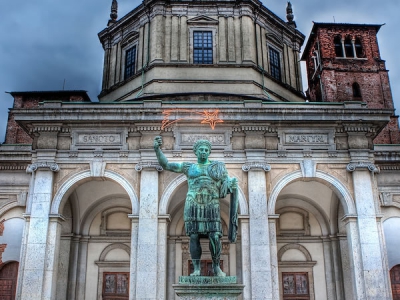
Church of San Lorenzo Maggiore
The Church of San Lorenzo Maggiore was erected in the 4th century and is the oldest in Milan. Dedicated to the Christian martyr San Lorenzo, it was built with the remains extracted from other Roman sites.
What to see
In the interior, decorated with marble and mosaics, the Saint Aquilino Chapel stands out, where you can see Byzantine mosaics from the 4th century.
From the chapel you can access to a kind of crypt where you can see some of the original materials with which the church was built, which were extracted from a Roman......
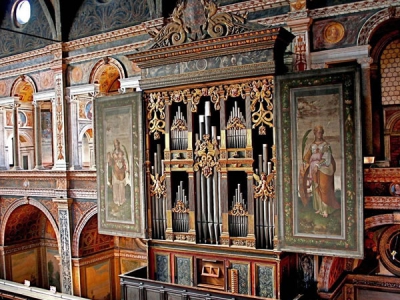
San Maurizio al Monastero Maggiore
The Church of San Maurizio al Monastero Maggiore was conceived as part of the female convent of the Benedictines, the most important congregation in Milan. At present the church presents an unbeatable state of preservation and the convent functions as headquarters of the Archaeological Museum of Milan.
The interior of San Maurizio
The sober exterior appearance of the church hides an incomparable beauty inside. The walls are covered with beautiful, well-preserved 16th-century frescoes.
Moving through the church you will discover the greatest of its secrets. It is divided in two by means of a central......
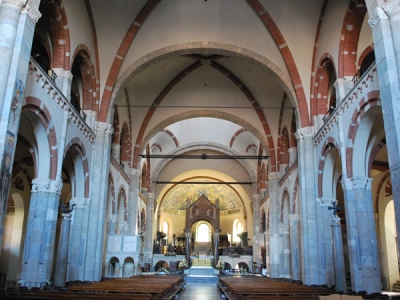
Basilica of Sant Ambrogio
The Basilica of St. Ambrose was consecrated in 387 by the saint who gave it its name. During the XI century it was rebuilt in Lombard Romanesque style and became the model for all the churches that were later built in the same style.
The Basilica of St. Ambrose presents a rare exterior appearance composed of two brick towers of different heights and a huge atrium, almost as large as the church, in which you can see some archaeological fragments.
Below the pulpit is the Sarcophagus of Stilicho, a masterpiece of the fourteenth century composed of......
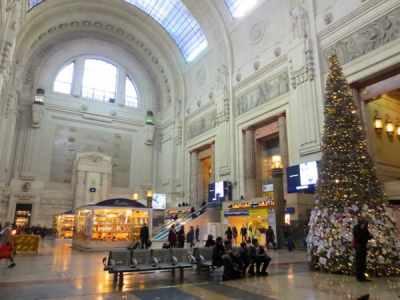
Milan Central Station
Milan Central Station (Milano Centrale) is one of the largest and most monumental stations in Europe. Inspired by the modernism of the early twentieth century, the station has a mix of styles, especially Art Nouveau and Art Deco.
The past of the Central Station
The station was inaugurated in 1931 to replace the old central station, since it was no longer able to withstand the continuous increase in passenger traffic.
The project, much simpler during its beginnings, advanced slowly as it became a majestic construction after the coming to power of Mussolini, who claimed that the station......
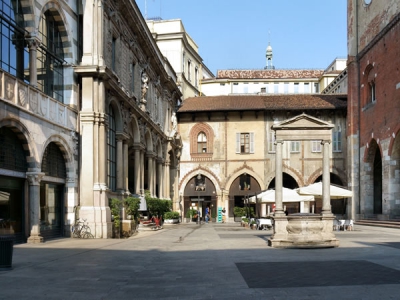
Piazza Mercanti
Piazza Mercanti is a picturesque square located a short distance from the Duomo. Although during the Middle Ages the square was the commercial and governmental center of Milan, today it is a pleasant medieval corner where you can see curious buildings.
Representative buildings
Piazza Mercanti preserves the medieval atmosphere of the past thanks to the curious buildings that surround it, since they continue practically intact. These are some of the most important:
Palazzo della Ragione: The imposing red brick building of Palazzo della Ragione was inaugurated in 1233 to house the courts of the city. At the......
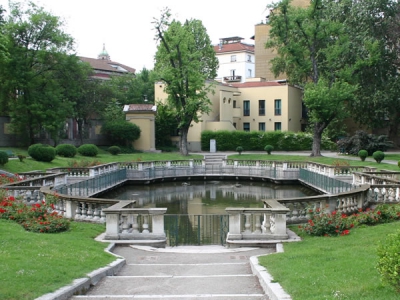
Public Gardens of Milan
With an area of 160,000 square meters, the Public Gardens of Milan (Giardini Pubblici Indro Montanelli) are the second largest park in the city behind Sempione Park.
The park is full of trees, fountains and lawns that fill with people during the hottest days.
Besides being a valuable green area, the park has some added attractions such as the Palazzo Dugnani, an imposing 17th century building, the Museum of Natural History, which has large sections dedicated to mineralogy and zoology, or highly recommended Modern Art Gallery.
In Milan, green areas are not too abundant, so both......
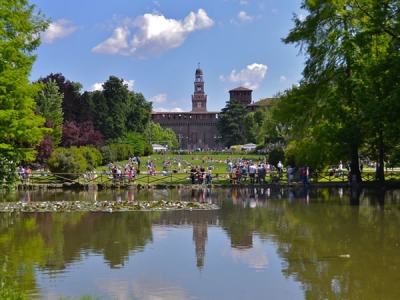
Sempione Park
The Sempione Park is a huge green space located next to the Sforzesco Castle. The park, built between 1890 and 1893, was designed in the style of English gardens.
It is a park of more than 47 hectares where you can find, in addition to large grassy areas full of trees and vegetation, a nice artificial lake that works as a home for some ducks.
Buildings of the park
In addition to hundreds of species of animals and vegetables, in the park are some interesting buildings:
- The Triennale: The Triennial Foundation promotes the development of avant-garde Italian art and......
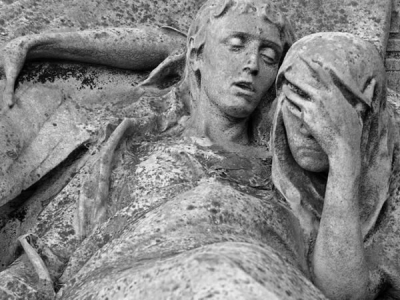
Monumental Cemetery of Milan
The enormous Monumental Cemetery of Milan stands out for the great number of tombs of high artistic level that it possesses. More than a cemetery, it is an open-air museum that shows impressive works from the 19th century to the present day.
The Monumental Cemetery was built in 1866 to unify the small and unhealthy cemeteries that were distributed throughout the city.
With a land of more than 250,000 MQ of open-air space, the cemetery contains a wide range of sculptures from Italian Artists, Greek temples, obelisks, and even a small-scale version of Trajan's Column.
In......
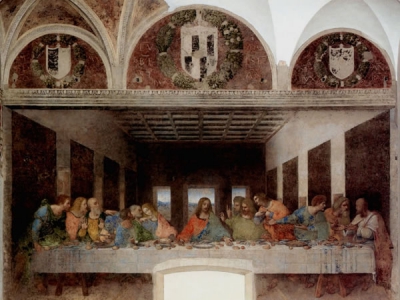
The Last Supper by Leonardo da Vinci
The Last Supper of Leonardo da Vinci (also known as the Cenacolo Vinciano) is one of the most famous paintings in the world. The original mural, created between 1495 and 1497, can still be seen in its first location, the wall of the dining room of the former convent of the Dominicans of Santa Maria delle Grazie.
Leonardo's Last Supper is an enormous 460-centimeter-high 880-wide painting, made with tempera and oil on a plaster preparation, instead of the common fresco technique.
The creation of the work
The religious order of the Dominicans allowed......
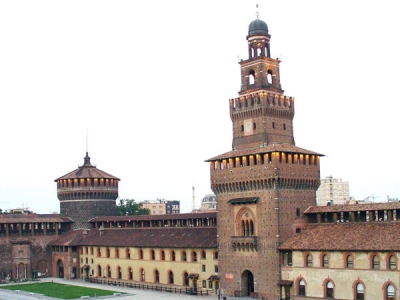
Sforzesco Castle
Sforzesco Castle (Castello Sforzesco) was built as a fortress during the 14th century and is one of the most emblematic monuments of Milan. Today it houses some of the best museums in the city.
The Sforzesco Castle was built as a fortress in 1368. Later it was transformed into a splendid palace ducal that would be practically destroyed during the Ambrosian Republic.
The Sforza family strove to turn the castle into one of the most magnificent courts in Italy, but later passed into the hands of the Spanish and Austrians and regained its former military function.
With the......
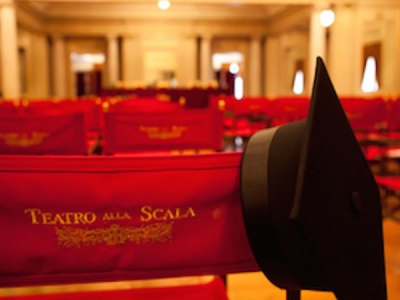
Teatro alla Scala di Milano
The Teatro alla Scala is one of the most famous opera houses in the world. Its sober exterior appearance envelops an old beauty that does not cease to amaze its visitors.
When a fire destroyed the old Theater Ducale in 1776, the Archduke Ferdinand of Austria ordered the construction of a new one. The theater was built in the place where the Church of Santa Maria alla Scala was located, which would give name to the new theater of the city.
Like other theaters of the time, Teatro alla Scala also functioned as a casino......
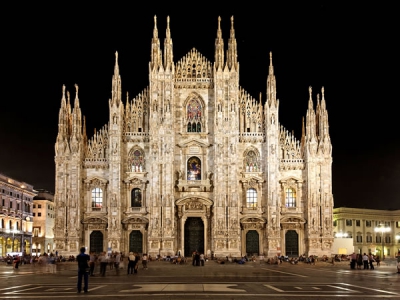
Milan Cathedral
The Cathedral of Milan, better known as the Duomo, is a huge Gothic cathedral that is located in the heart of the city. With 157 meters in length, 11,700 square meters and space for more than 40,000 people, the Milan Duomo is one of the largest Catholic cathedrals in the world.
The place was occupied by the Basilica of St. Ambrose from the fifth century, and in 836 was added the Basilica of St. Tecla. In 1075 both buildings were destroyed by a great fire and in 1386 the construction of the Duomo began in the same place.
......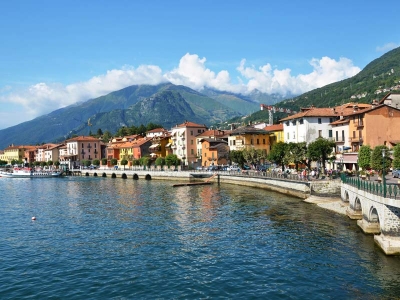
There are many places that overlook Lake Como, the third, with an area of 145 square kilometers, the largest in Italy. Here is an overview of the most important, with some ideas on what you can offer.
Como
Como, the city that gives its name to the lake. It is a center of artistic and historical absolute charm, with its ancient walls and the vast wealth of monuments and churches, among which the Duomo and the Basilica of Sant'Abbondio. The city of Como is one of the most beautiful in the North of Italy: in fact many artists have found......
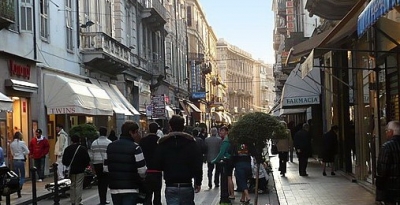
Via Montenapoleone is part of the "Fashion District Milanese" which includes over the same street, Via della Spiga, Via Manzoni and Corso Venezia.
In these routes are the most popular shops such as Dolce & Gabbana, Ferre, Krizia, Missoni, Valentino, Versace and Zegna. The name of this street comes from public bank, the pawnshop who had been wanted in this way just by Napoleon.
Via della Spiga, the heart of the famous "The Fashion", is one of the most luxurious areas of Milan, but unlike the other 3 Vie here there is no traffic. In fact, for this reason is......
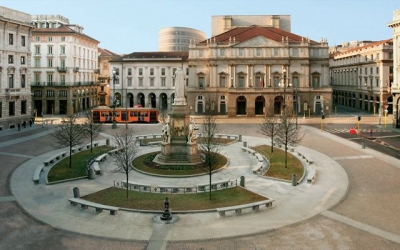
Piazza della Scala starts or ends depending on your point of view at the end of the northern Galleria Vittorio Emanuele II, which connects Piazza Duomo. This entire area is considered the "heart of Milan": The monumental area enclosed between these two spaces, which is both the administrative center of the City and the Religious and Cultural.
The Teatro alla Scala urbanistically interacts with the other buildings that face: Palazzo Marino, in front, and the two palaces of the Italian Commercial Bank on the sides.
The name of the square is due to the well known "Temple of the Opera",......
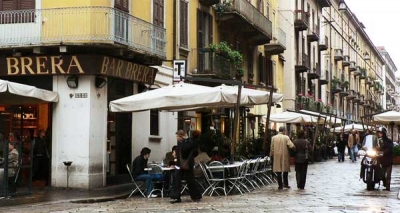
The district "Brera", also known as the artists' quarter blends art, history, culture, architecture, and above all music that has always attracted tourists from around the world, for its timeless charm. In fact in this neighborhood seems that everything has stopped short, the atmosphere is magical.
Brera is a district where you can find plenty of bars, restaurants and "literary cafes", frequented all day and night. In hot months many restaurants were equipped with terrace allowing you to enjoy drinks and meals in a picturesque and magical atmosphere.
......
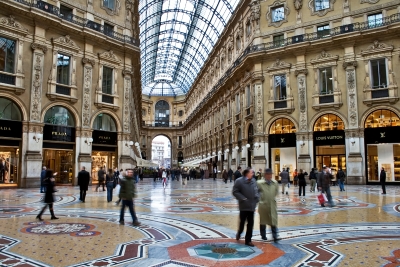
The Galleria Vittorio Emanuele II was opened in 1867 and completed in 1878, is the walkway of excellence that connects Piazza del Duomo to Piazza della Scala.
This impressive gallery is also nicknamed "the Lounge of the Milanese" for the environment gorgeous, but also for elegance and wealth of prestigious shops, brands, restaurants, trendy bars and very famous bookstores.
The gallery is formed by a plant to cruise inside which stands out the central dome in iron and glass. It is 196 meters long and connects Piazza del Duomo with Piazza della Scala.
The arms of the dome are high up to......
BookTaxiMilan, your local expert for Milan Airport Transfers.
Check for more information about Milan at https://www.ricksteves.com/







